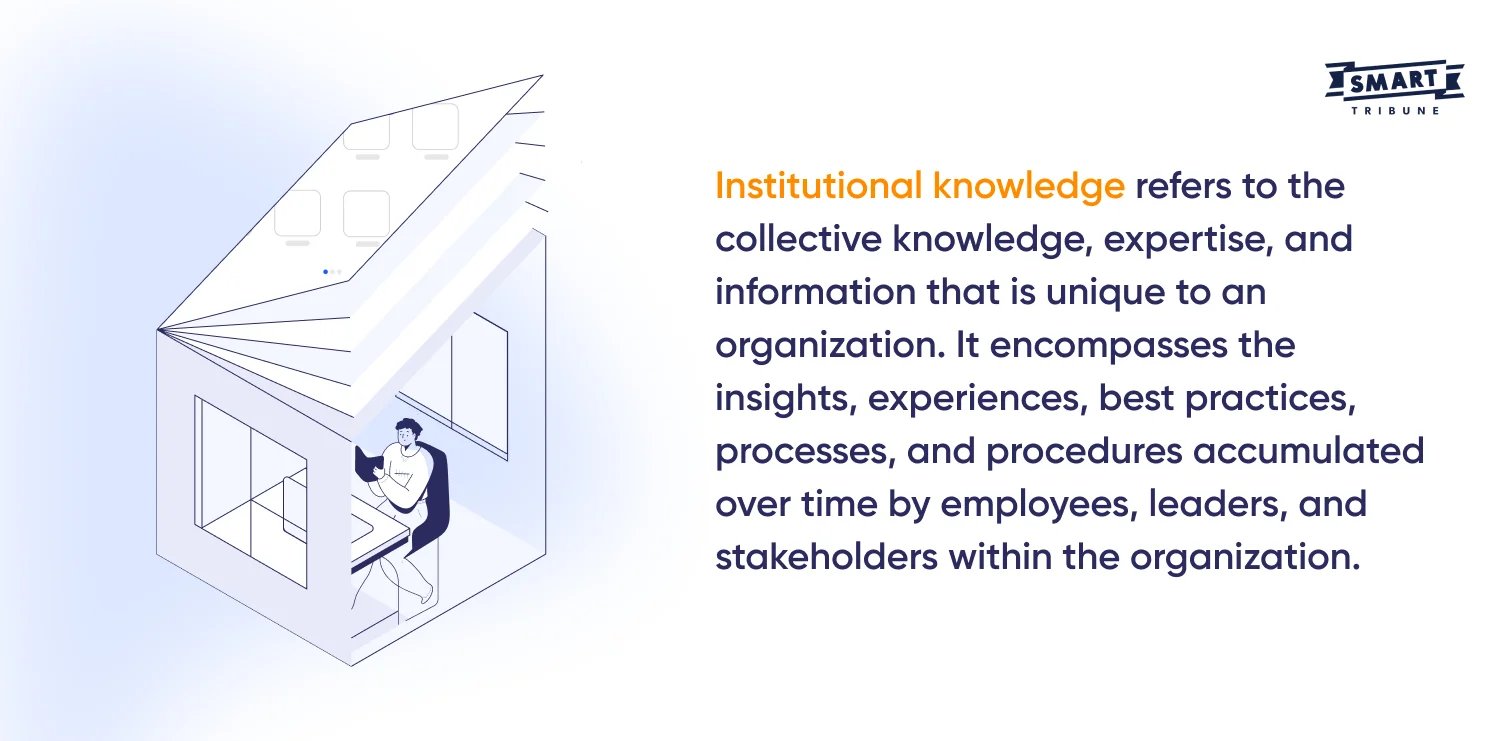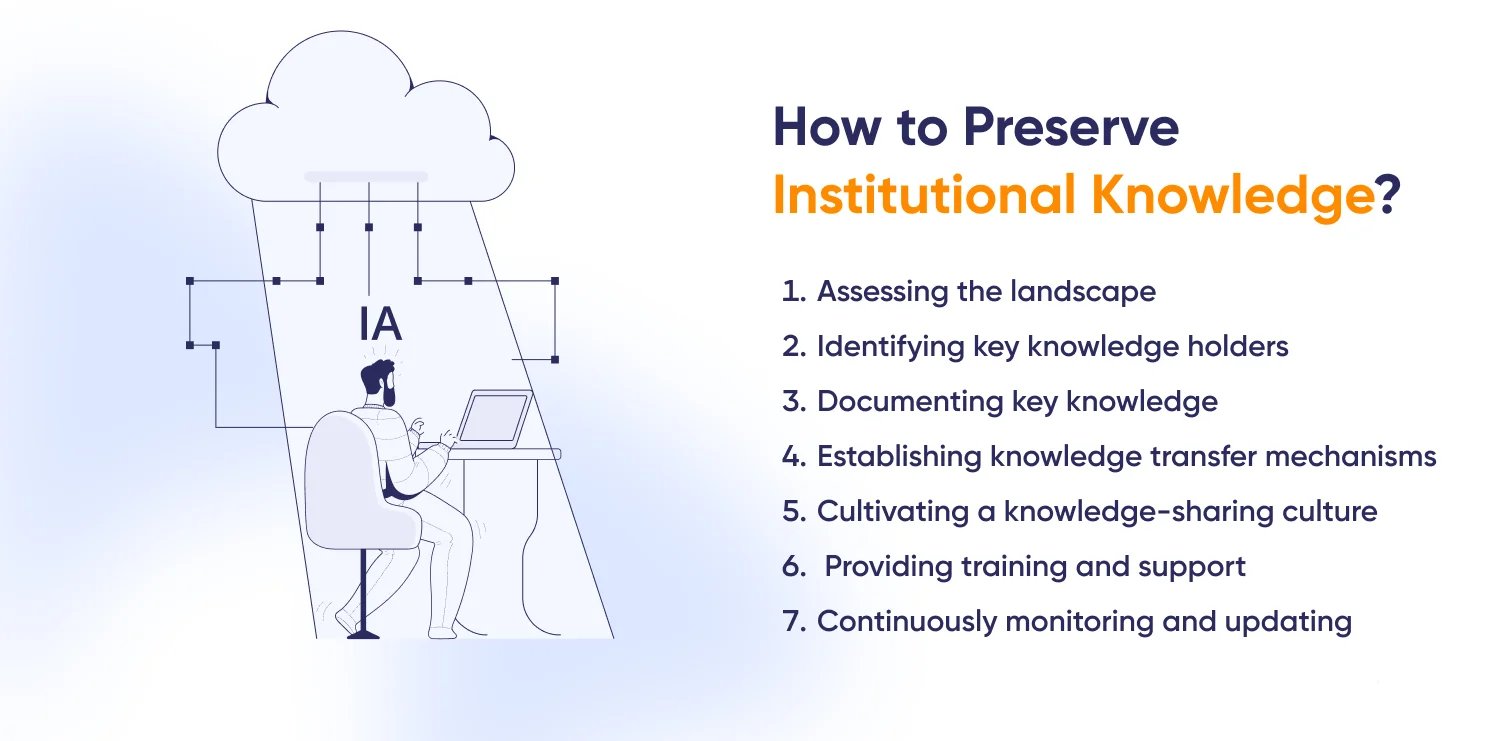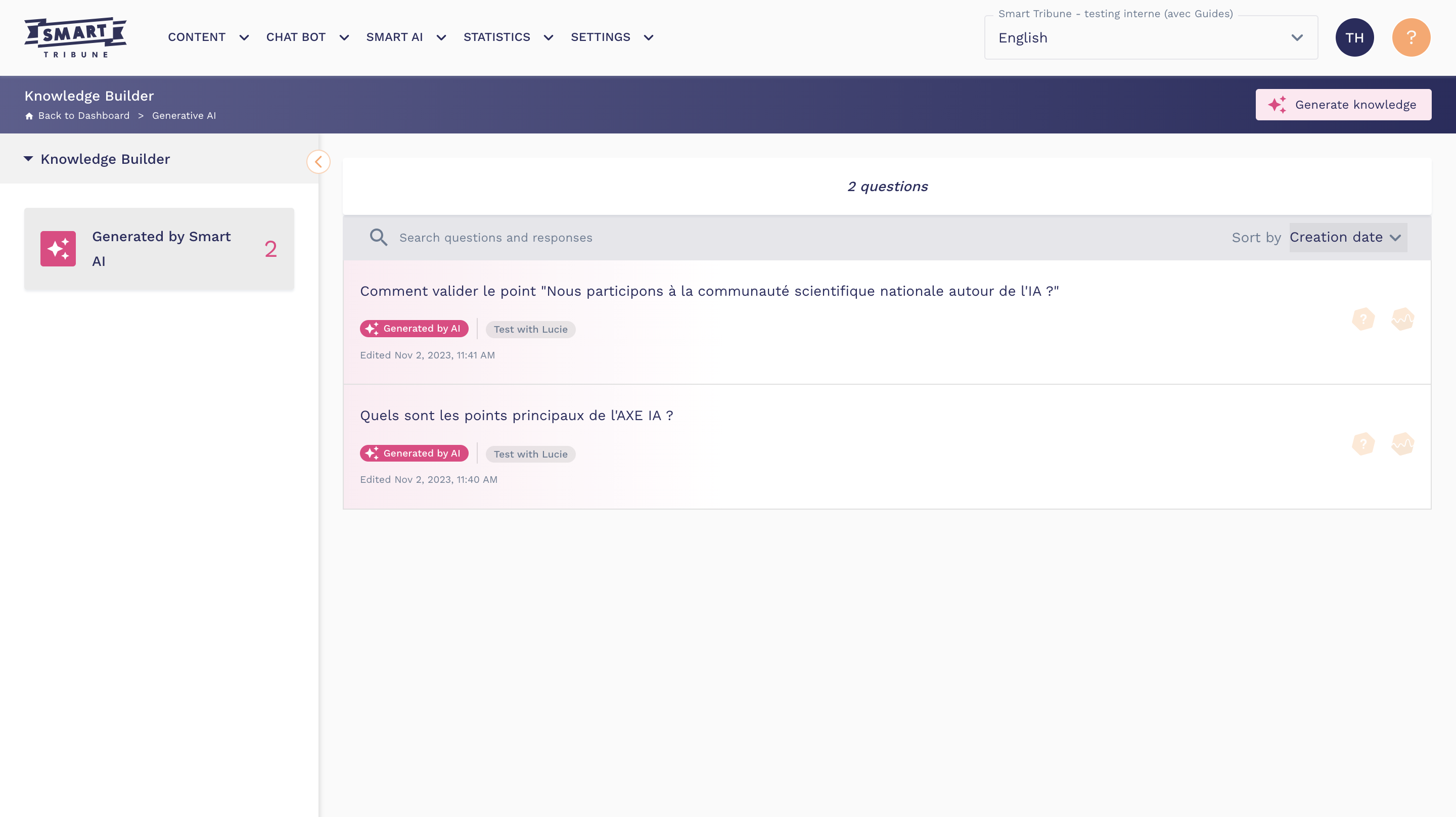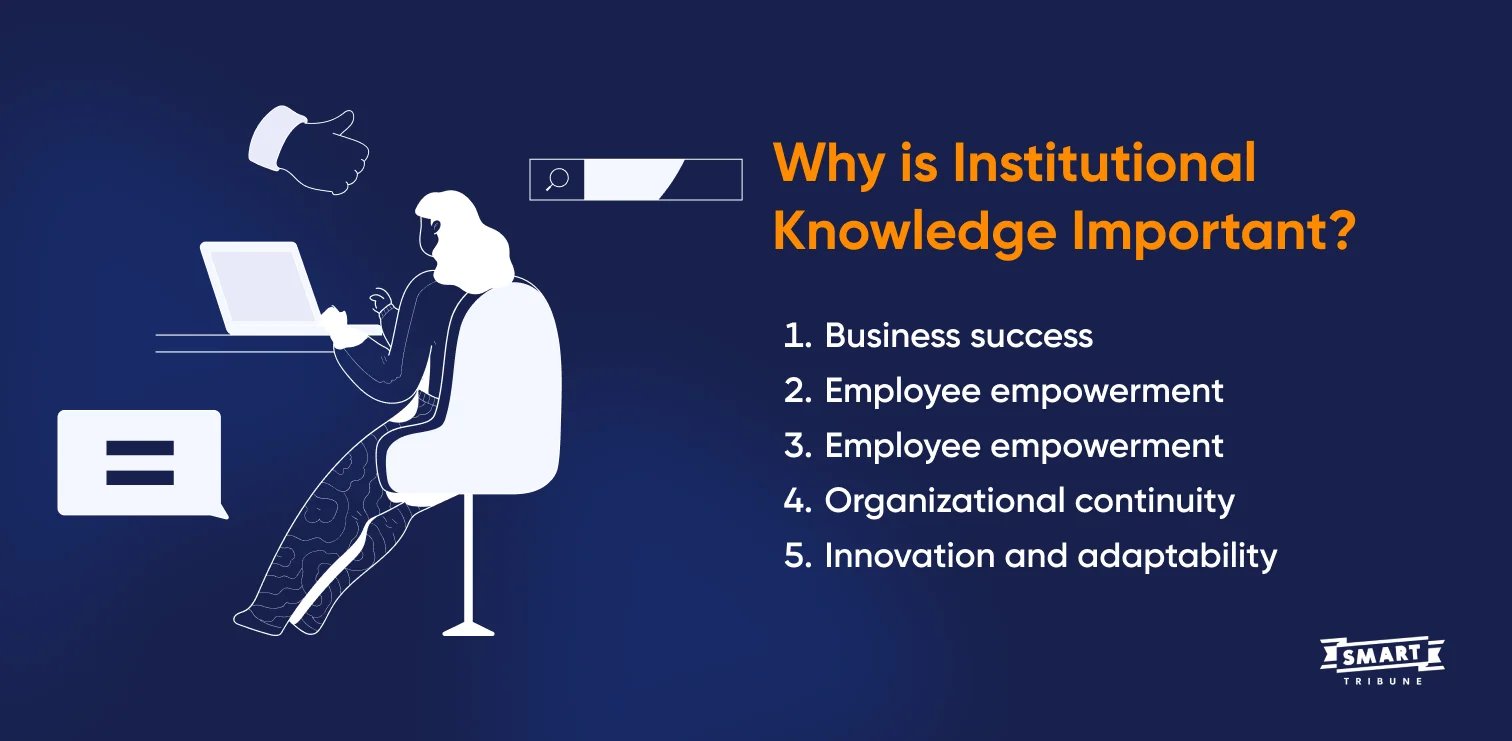
On APRIL 8, 2024
What is Institutional Knowledge | Importance, Types, Examples & How to Capture
Imagine this: a new employee starts their first day, eager to learn the ropes. But their veteran colleagues, the oInes who hold the key to success, are shrouded in mystery. Their knowledge – a treasure trove of experience and best practices – feels more like tribal secrets than accessible information. This is the curse of institutional knowledge, that hidden reservoir of wisdom that can make or break a company.
But fear not, knowledge seekers! In this article, we'll dive deep into the world of institutional knowledge. We'll explore:
- Digestive definition of institutional knowledge,
- Comprehensive guide to retaining knowledge,
- Benefits of organizational knowledge,
- How Smart Tribune helps businesses preserve institutional knowledge,
- Frequently asked questions about sharing knowledge in the workplace.
If you are pumped and so am I, let's get cracking!
What is Institutional Knowledge?
In case institutional knowledge may sound unfamiliar, let's check out its fundamentals.
1. Institutional knowledge definition
Institutional knowledge refers to the collective knowledge, expertise, and information that is unique to an organization. It encompasses the insights, experiences, best practices, processes, and procedures accumulated over time by employees, leaders, and stakeholders within the organization.

2. Types of institutional knowledge
Basically, company knowledge can be categorized into 3 groups:
|
Explicit knowledge |
Implicit knowledge |
Tacit knowledge |
|
Tangible and codified information that is easily documented, stored, and shared. This includes policies, procedures, manuals, guidelines, reports, and databases. |
Knowledge that is less tangible and often based on experience, intuition, and personal expertise. This includes insights, best practices, strategies, and techniques that are not explicitly documented but are embedded in the organization's culture and practices. |
Deep-seated knowledge that is difficult to articulate or transfer to others. This type of knowledge is highly personal and typically based on individual experience, skills, and intuition. It includes insights, judgment, intuition, and know-how that are developed over time through hands-on experience. |
Learn more about the differences and examples of explicit, implicit and tacit knowledge.
How to Preserve Institutional Knowledge?
To safeguard against the loss of institutional knowledge, businesses must implement strategic initiatives aimed at its preservation. Here's how:

1. Assessing the landscape
Before embarking on the journey to preserve institutional knowledge, it's essential to gain a comprehensive understanding of the organization's current state.
Conduct a thorough assessment to identify:
- Key knowledge domains,
- Critical knowledge holders,
- Areas of vulnerability.
This assessment serves as the foundation upon which the preservation plan will be built.
2. Identifying key knowledge holders
Central to any preservation plan is the identification of key knowledge holders within the organization. These individuals possess invaluable expertise, insights, and experience accumulated over years of service. Through interviews, surveys, and knowledge mapping exercises, pinpoint these knowledge custodians and engage them in the preservation process.
3. Documenting key knowledge
Institutional knowledge or employee knowledge, to some extent, exists in two forms: tacit and explicit.
Tacit knowledge resides in the minds of employees and is often difficult to articulate or document. Explicit knowledge, on the other hand, encompasses documented processes, procedures, and best practices.
Develop a strategy to capture both forms of knowledge, leveraging tools such as interviews, storytelling sessions, and documentation platforms.
4. Establishing knowledge transfer mechanisms
Effective knowledge transfer mechanisms are essential for disseminating knowledge from experienced employees to their successors.
Implement mentoring programs, job shadowing opportunities, and cross-training initiatives to facilitate the transfer of tacit knowledge.
Additionally, leverage technology solutions such as knowledge repositories and collaboration platforms to streamline knowledge sharing across the organization.
To illustrate knowledge repository and collaboration platform in organizational usage, take Smart Knowledge as an example. Smart Knowledge is a knowledge management system designed to seal knowledge gaps, streamline the knowledge transfer process and ensure new hires keep pace with the team in terms of information, insights, procedures and expertise.
By providing generative AI power and semantic search function, Smart Knowledge enables veterans to share experience and prowess within clicks and allows novices to quickly find the right institutional knowledge without using exact-match queries.
Learn more about knowledge transfer in organization settings:
- Ins and outs of knowledge transfer plan and downloadable template
- How to develop a knowledge management framework that benefits your business?
- How internal knowledge base boost employees' efficiency?
5. Cultivating a knowledge-sharing culture
Creating a culture of internal knowledge sharing is paramount to the success of any preservation plan. That's why leaders must foster an environment where employees are encouraged to share knowledge in the workplace, their expertise, insights, and lessons learned openly.
To build this supportive environment, leaders should
- Prioritizing knowledge sharing through open communication channels,
- Recognize and reward knowledge-sharing behaviors
- Provide a platform, which is mentioned above - Smart Knowledge, for employees to collaborate and exchange ideas seamlessly.
6. Providing training and support
Empower employees with the skills and tools they need to effectively participate in knowledge preservation efforts. Leaders can offer:
- Training programs,
- Workshops,
- Resources to educate employees on knowledge management best practices, documentation techniques, and the use of technology solutions.
7. Continuously monitoring and updating
Preservation is an ongoing process that requires regular monitoring and updates. Knowledge managers need to
- Establish clear knowledge management metrics and KPIs for monitoring the effectiveness of knowledge preservation initiatives,
- Gather feedback from stakeholders.
- Continuously review and update knowledge assets
to ensure relevance, accuracy, and completeness.
Understanding that regularly monitoring and updating is integral in knowledge retention, Smart Knowledge equips users with obsolescence alerts and agent feedback feature. Furthermore, Smart AI - your AI knowledge management assistant, speeds up revision by generating up-to-date content based on your documents.

Why is Institutional Knowledge Important?
As a matter of fact, institutional knowledge serves as a critical asset that underpins various aspects of business operations and relationships, benefiting businesses, employees, and customers alike. Let's uncover the significance of institutional knowledge.

Business success
Institutional knowledge is the backbone of strategic decision-making and operational excellence within organizations. By drawing on past experiences, industry trends, and market insights, businesses can make informed decisions that drive growth and profitability.
For example, a manufacturing company may rely on institutional knowledge to optimize production processes, reduce costs, and improve product quality based on past performance data and industry best practices.
Employee empowerment
For employees, institutional knowledge makes a substantial contribution to accelerating learning and fostering professional development. Access to institutional knowledge enables new hires to quickly onboard and contribute effectively to the organization.
Furthermore, it provides employees with guidance, mentorship, and best practices that enhance job performance and enable them to navigate challenges with confidence.
For instance, a sales representative may leverage institutional knowledge to understand customer preferences, anticipate objections, and tailor sales strategies for maximum impact.
Customer satisfaction
Institutional knowledge plays a crucial role in delivering exceptional customer experiences, nurturing long-term loyalty and increasing customer advocacy. By understanding customer needs, preferences, and pain points, businesses can customize their products, services, and interactions to meet customer expectations effectively.
In a real-life scenario, a retail company may use institutional knowledge to personalize marketing campaigns, anticipate customer inquiries, and proactively address issues, resulting in higher customer satisfaction and retention rates.
Organizational continuity
Preserving institutional knowledge ensures continuity and resilience within organizations, particularly during times of change or transition. As employees retire, move on to new roles, or join the organization, institutional knowledge serves as a valuable resource that preserves organizational memory and prevents the loss of critical insights and expertise.
This continuity enables businesses to maintain consistency in operations, uphold quality standards, and avoid disruptions in service delivery.
Innovation and adaptability
Institutional knowledge fosters innovation and adaptability by providing a foundation for experimentation, creativity, and continuous improvement. By learning from past successes and failures, organizations can identify opportunities for innovation, develop new products or services, and respond effectively to changing market dynamics.
How Smart Tribune Streamlines Institutional Knowledge Preservation?
Every efficient institutional knowledge management strategy stipulates powerful technology solutions.
As technology plays a pivotal role in modern knowledge management efforts, stakeholders should invest in robust knowledge management systems, digital repositories, and collaboration tools to centralize and organize institutional knowledge. That's when Smart Tribune comes in handy.
Smart Tribune is an all-in-one solution tailored to businesses of all sizes. Let's check out what sets this knowledge management solution apart.
Smart Knowledge - The centralized wellspring
Imagine a single, organized wellspring containing all your organization's critical knowledge. Smart Knowledge serves as this central repository, consolidating information from various sources like documents, FAQs, and even past case studies.
No more information silos and scrambling through scattered platforms; Smart Knowledge ensures everyone has access to the same accurate information in one easily accessible location.
Here's what makes Smart Knowledge a game-changer:
- Intelligent search: Forget struggling with keywords! Smart Knowledge utilizes the power of AI and semantic search to understand the intent behind an employee's query. This allows the platform to surface the most relevant information, even if the keywords aren't an exact match. Think of it as a mind reader for your knowledge base, saving valuable time and reducing frustration.
- Evergreen content: Maintaining a fresh knowledge base is crucial. Smart Knowledge tackles this challenge with a two-pronged approach. Automated alerts flag outdated content based on pre-defined parameters or changes in company policies. Additionally, it leverages employee feedback to identify areas needing revision. This ensures employees consistently utilize the most accurate and current information.
- AI-powered content creation and update: Updating knowledge doesn't have to be a time-consuming chore. Smart AI steps in as a helpful assistant. It suggests relevant content based on existing data and emerging trends, streamlining content creation and allowing subject-matter experts to focus on providing the most valuable knowledge.
Smart Knowledge transforms from a static storage unit into a dynamic and intelligent resource. Employees can quickly access the information they need, leading to improved decision-making, faster problem-solving, and enhanced efficiency.
Smart AI - The engine of intelligence
Smart Knowledge wouldn't be as potent without its AI engine room – Smart AI. This suite of AI functionalities empowers Smart Knowledge to deliver a truly intelligent experience:
- Automated knowledge management: Say goodbye to manual knowledge base upkeep. Smart AI automates the process of updating FAQs and knowledge articles, freeing up valuable time for customer service agents to focus on complex issues.
- Content intelligence: Smart AI analyzes customer inquiries and employee interactions to identify areas for improvement and suggest new content creation. This ensures your knowledge base constantly evolves to address emerging needs.
- Multilingual support: Does your organization serve global audiences and employ global team members? Smart AI can translate content into over 100 languages, making vital knowledge readily accessible to employees and customers worldwide.
With Smart AI at the helm, subject-matter experts in your organization can save time in sharing knowledge and expertise and your new hires can increase productivity with the earned institutional memory.
Smart Dashboard - The knowledge command center
The final piece of the puzzle is Smart Dashboard – your comprehensive command center for monitoring and managing your knowledge base. This user-friendly interface provides valuable insights and functionalities:
- Real-time analytics: Smart Dashboard tracks key metrics like search trends and user activity, providing valuable insights into how employees are utilizing the knowledge base. This data allows organizations to identify areas for improvement and optimize their knowledge content.
- Performance monitoring: Smart Dashboard tracks the effectiveness of your knowledge base to identify frequently accessed content and pinpoint areas where information might be missing or unclear. This ensures your knowledge base remains relevant and addresses employee needs.
- Customization options: Smart Dashboard allows organizations to tailor Smart Knowledge to their specific needs. Departments can create custom dashboards, categorize information for easy access, and configure workflows for content creation and approval.
By leveraging Smart Dashboard's comprehensive features, organizations can ensure the knowledge base remains a valuable and dynamic resource, constantly evolving to meet the needs of a changing workforce.
FAQs about Institutional Knowledge
1. What is institutional knowledge?
Institutional knowledge boils down to knowledge of the company which includes collective expertise, insights, and experience that an organization accumulates over time. It encompasses the unique practices, processes, and understanding specific to a particular organization, often residing in the minds of its employees.
2. Why sharing knowledge is important?
Sharing knowledge in the workplace is crucial because it fosters collaboration, accelerates learning, and drives innovation. By sharing knowledge, employees can leverage each other's expertise, avoid redundant work, and solve problems more efficiently. It also cultivates a culture of continuous improvement, where new ideas can flourish and the organization can adapt to changing circumstances more effectively. Ultimately, knowledge sharing leads to higher productivity, better decision-making, and enhanced organizational performance.
3. What is an example of institutional knowledge?
One of the organizational knowledge examples in customer service could be the specific protocols or phrases developed by experienced representatives to handle challenging customer inquiries. These nuanced approaches, refined through years of interactions, effectively resolve issues and maintain customer satisfaction, yet may not be formally documented in training materials.
4. How to transfer institutional knowledge when a manager quits?
When a manager quits, transferring institutional knowledge involves capturing their expertise through interviews, documentation, and shadowing. Stakeholders may:
- Encourage the manager to share their insights, processes, and best practices with team members,
- Document key information, create training materials,
- Facilitate shadowing opportunities for successors to learn firsthand.
- Provide ongoing support to ensure a smooth transition of knowledge and responsibilities.
Final Thoughts on How to Build a Knowledge-centric Organisation
In a dynamic business landscape, safeguarding institutional knowledge is no longer optional. Platforms like Smart Knowledge, with their intelligent functionalities, empower organizations to capture, organize, and readily share this invaluable asset. This ensures a future-proofed workforce with the knowledge and resources needed to thrive, fostering innovation and propelling them towards long-term success.
Hope that after reading this article, you are fully armed to preserve institutional knowledge with a state-of-the-art solution. Should you have any further inquiries related to knowledge management, drop us a line for assistance.


.png)



